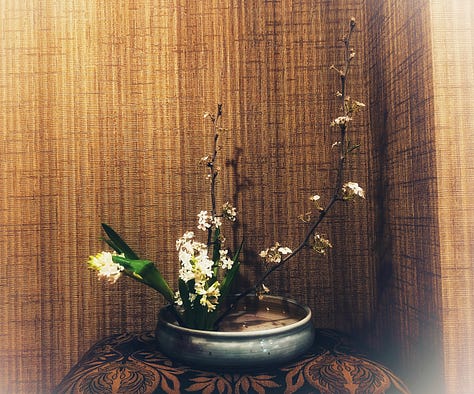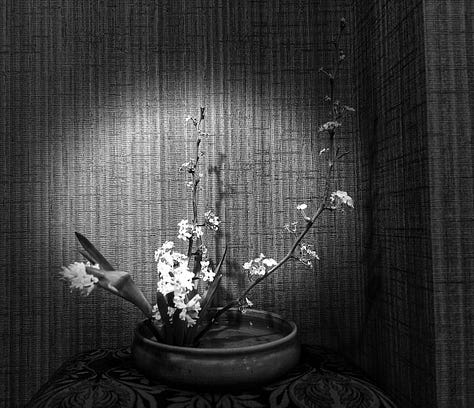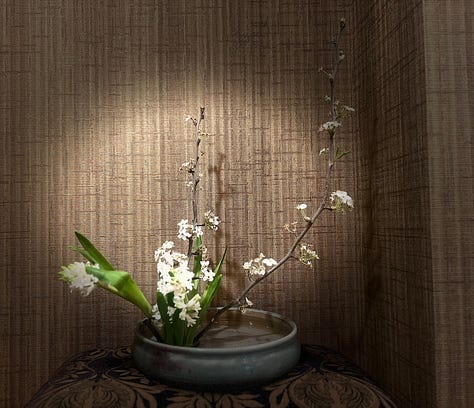


1.
During Tang dynasty times, in China there was a woman so desirable she was thought capable of causing the destruction of the nation: 傾国の美女
Yang Guifei 楊貴妃 was only 37 when she was strangled in the year 756—as her lover the emperor looked on, mad with grief —over the loss of his empire …Or was it really over the loss of his beloved lady Yang?
When my beloved ikebana sensei said she was bringing pear blossoms to our flower lessons, I had to check and make sure I read that right since pear is not often used in Japanese flower arrangement. And what I really love about pear blossoms is their association with Yang Guifei.
2.
Like a lot of people around February, I start anxiously awaiting the pageant of flowering trees… from plum and almond to cherry blossoms…. in Los Angeles, it all culminates in the vibrant red bud and jacaranda trees—when purple blossoms are seen scattering in the spring winds. I love it all so much…. But pear has never been on my radar before—maybe because in Japan, they have not been traditionally appreciated in poetry.
Sei Shonagon, in her Pillow Book, declared pear blossoms to be “the most prosaic, vulgar thing in the world.”
And
The less one sees this particular blossom the better, and it should not be attached to even the most trivial message.
Back then, people attached flowers and leaves to their letters…. but according to Sei Shonagon, nothing was banal enough to use a pear blossom.
But then later on the same page, she begins to change her mind:
The pear blossom can be compared to the face of a plain woman; for its colouring lacks all charm. Or so, at least, I used to think. Knowing that the Chinese admire the pear blossom greatly and praise it in their poems, I wondered what they could see in it and made a point of examining the flower.
Then I was surprised to find that its petals were prettily edged with a pink tinge, so faint that I could not be sure whether it was there or not. It was to the pear blossoms, I recalled, that the poet likened the face of Yang Guifei when she came forth in tears to meet the Emperor's messenger - "a spray of pear blossom in spring, covered with drops of rain."
Sei Shonagon is referring to the legendary poem by Bai Juyi (known as 白居易Haku Rakuten in Japanese), the Song of Everlasting Sorrow 長恨歌. This is the poem that became the model for the “Kiritsubo” chapter of the Tale of Genji. In the poem by Bai, in the moment of death, Yang Guifei’s face is covered in tears. Some say the poem describes how she looked at the moment of death while others say it describes how she looked when she stepped forward to meet her fate.
lonely the tears spilling down her pale face
like a sprig of pear blossoms covered in spring rain….
玉容寂寞涙闌干
梨花一枝春帯雨
玉容 face like jade (pale, beautiful, gem-like)
梨花一枝 a branch of pear blossoms
I love these lines from the same poem
蜀江水碧蜀山青,
聖主朝朝暮暮情。
行宮見月傷心色,
夜雨聞鈴腸斷聲。
Shu waters flow green, Shu mountains show blue,
His majesty's love persists night and day, day and night
In exile he gazes up at the moon, his heart broken
Bells chiming in the evening rain carry his sorrow
Notes:
I love the expression 傾国の美女.
From the opening line of Bai Juyi’s poem: 漢皇重色思傾國 of a Han emperors desire for a woman who rocked an empire…
A Castle-Toppler is how poet Sally Wen Mao describes her:
A charming beauty who makes men fall and leads to disasters (such as a loss of wealth or reputation, or a toppled nation); dangerous woman; femme fatale
红颜祸水
red face, troubled water
a dangerous beauty who rains ruin upon the nation
Have you ever heard of that expression?
In Japanese:
紅顏禍水





I'm sure you know the Kyoto temple dedicated to Yang Guifei...
Gorgeous pictures in this lovely post. I hadn't heard of pear blossoms as a thing, often peach blossoms in China. But i found this poem by Su Shi, who seems to be on everyone's mind lately. He wrote it while he lived in Suzhou.
梨花淡白柳深青,
柳絮飞时花满城。
惆怅东栏一株雪,
人生看得几清明!
Snow white are the blossoming pears,
And liquid are the willows’ dark green.
The catkins are floating like snowing;
The town’s glowing with vibrant spring.
At the east fence I find a lonely man,
By a lonely tree like pure snow, sighing:
How few are such a view of Qingming!
How few can really see life’s meaning!
translation by Julia Min at https://www.rhymesandvibes.com/post/%E4%B8%9C%E6%A0%8F%E6%A2%A8%E8%8A%B1-the-blooming-pear-tree-by-east-fence